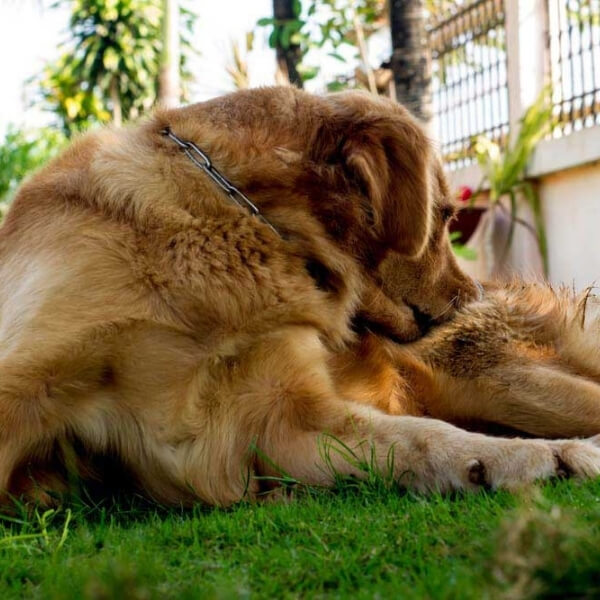Our Services
Pet Skin ConditionsCats and dogs can suffer from a variety of skin issues that require medical intervention to treat them thoroughly.
how to spot underlying issues
Pet Skin Conditions
If your pet is experiencing a skin-related issue, reach out to St. Louis Veterinary Center for an assessment by our veterinarian. Here’s some information on common pet skin problems to help you recognize when it might be time to contact us for an evaluation.
Watch for Signs of Scratching
If your pet scratches at their coat often, they may be dealing with skin irritation. Part your pet’s fur and look for signs of a visible rash. Rashes can be red or pink, or they may be skin-toned with raised bumps. A rash requires medication to clear it up in its entirety.
Look for the Presence of Fleas
Fleas can cause great distress to a pet. When fleas walk upon your pet’s skin, they will suffer from itchiness and irritation. They may bite or scratch at their skin in an attempt to find relief. This could cause sores upon the skin as a result. In addition to itchiness, fleas bite a pet’s skin. If your pet has a flea allergy, they may have raised bumps in areas where bites occurred. Our vet will treat the flea problem first to eradicate these pests. If the skin does not clear quickly after fleas are eliminated, medication may be necessary to treat it appropriately.
Avoid Bathing Your Pet Too Frequently
When you give your dog or cat a bath, their skin is stripped of natural oils necessary to keep the skin healthy. This can cause dryness of the skin. If your pet has flakes of skin in its fur, refrain from bathing sessions for a while.
Watch for Allergic Reactions
Allergies can cause skin problems. Some pets are allergic to fleas, causing the skin to break out in a rash. Others may be allergic to specific foods or elements in the environment. It is important to avoid triggers, so skin problems do not occur. If you are unsure about what is causing an allergic reaction, our vet will help you determine the trigger. Medication may be necessary to alleviate symptoms.
Check for Missing Fur Patches
When a pet bites or licks at jts fur constantly, it will eventually fall out. A pet may take to this type of behavior if they are dealing with a skin problem. Stress can also cause a pet to lose fur, so it is best to see our vet for an evaluation.
Contact St Louis Veterinary Center if your dog or cat is suffering from skin irritation or if it has a rash. Call us at 314-773-6400.
Common Skin Conditions Treated by Your St. Louis Veterinarian
Skin Conditions
You love your pets and want to keep them healthy. Watching them suffer from itchy or infected skin is torturous, but it does not have to continue. At St. Louis Veterinary Center, our team is dedicated to providing your pets with the best care possible, and that care starts at home. If you notice any of the following conditions or anything abnormal on your animals, give us a call to schedule an appointment.
Yeast Infection
Pets can suffer from yeast infections on their paws, ears, and other skin folds. A yeast infection can cause a lot of itching and discomfort. Aim to care for these infections as quickly as you notice them.
Flea Allergies
Some pets are allergic to fleas. When fleas bite, the pet ends up with itchy red spots. It is not abnormal for affected pets to lose hair in that area, either.
Mange
Mites in or on a dog’s skin can cause both sarcoptic and demodectic mange. Sarcoptic mange is better known as scabies, and it is contagious to humans and pets. Demodectic mange is not contagious to humans.
Allergic Dermatitis
Allergies to dust, pollen, mold, and food can cause an itchy red rash on your pet, known as allergic dermatitis.
Ringworm
Ringworm is a common, contagious skin infection that can cause scales, hair loss, and inflammation. If you notice any of these symptoms, visit your vet as soon as possible.
Lick Granuloma and Hot Spots
Both of these skin problems are caused by your pet excessively licking or biting one particular spot over and over again. This typically happens in response to an infection or other medical condition. It is important to note that hot spots can swell up in a matter of hours, have a foul odor, and may ooze. Lick granulomas are a little less intense, though they can cause deep infections. If you notice your pet biting, licking, or scratching the same spot repeatedly, get to an animal hospital as soon as possible.


